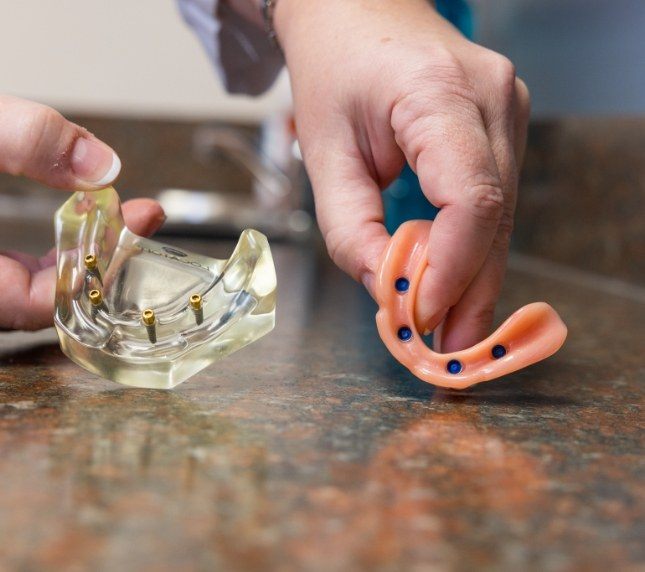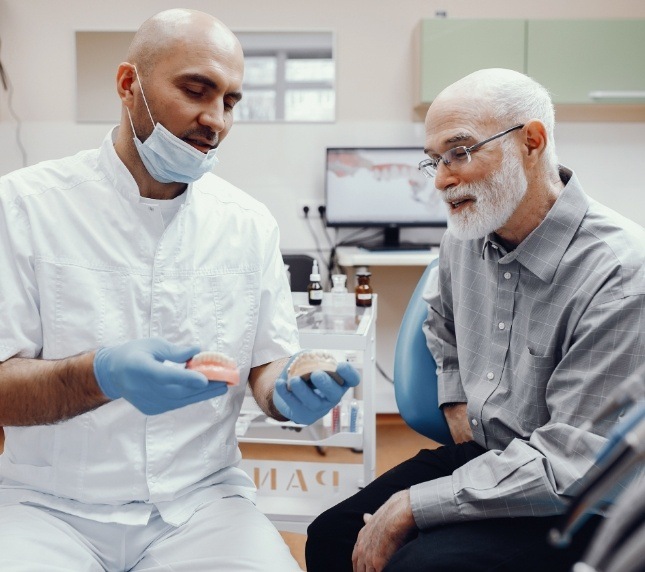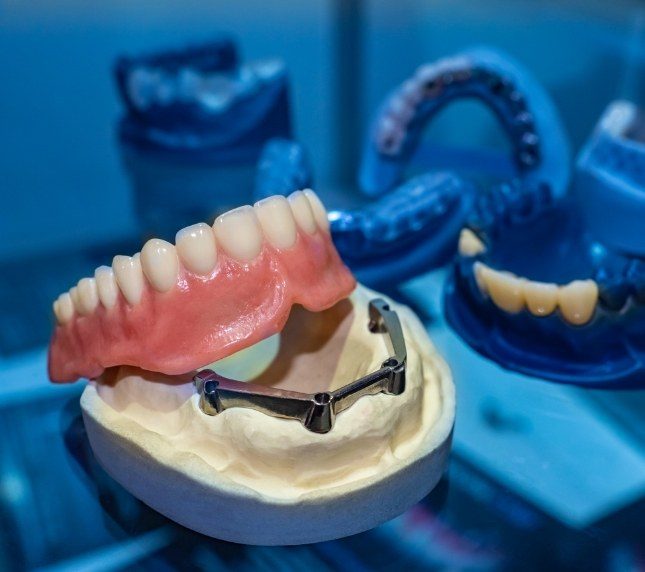Dental Implant Dentures Owings Mills
Strong, Long Lasting Arch Replacements
90% of those who have lost all their teeth use dentures to perform everyday tasks like speaking and eating. But if you’re tired of your false teeth slipping in your mouth or needing to take them out to clean them, Dr. Monica M. Mattson might suggest giving them an upgrade. By attaching your dentures to implants, you can enjoy a stronger, more stable, longer-lasting smile that will look and feel natural. Contact us today to learn if implant dentures in Owings Mills would be a good fit for your mouth.
How Do Implant Dentures Work?

Full dentures can be anchored to a conservative number of dental implant posts instead of resting on the gums. Unlike other forms of tooth replacement, dental implants interface with the jawbone itself to act as roots for prosthetic teeth. This prevents the teeth from slipping and gives them increased chewing power. Furthermore, the implants will stimulate the jaw whenever you bite and chew your food, which in turn prevents bone loss (a normal consequence of lost teeth). Both full dentures and partial dentures can be supported by implants, with the number of posts used depending on the situation.
Am I a Candidate for Implant Dentures?

To decide whether or not you’re a candidate for implant dentures, Dr. Mattson will perform a thorough oral examination, review your medical history, take any necessary X-rays, and discuss your expectations. Ideally, your jaw will already have enough density to support the implant posts (although we may be able to help you regain lost density with bone grafting). Your gums should also be completely free of infection, and you should be in good health overall; otherwise, your body might have trouble healing around the implant posts. Implants can be used to upgrade your traditional dentures, but they can also benefit patients who haven’t had false teeth before.
The Implant Denture Procedure

Before you receive your new teeth, we’ll place a number of implant posts in strategic locations in your jaw. The exact number might vary, but usually, 4 to 6 posts are enough to support a full arch. It can take several months for your mouth to fully heal after the procedure. During this time, the implants merge with the bone and effectively become part of your body. Once this process is complete, the implants will be ready to bear the load of full dentures. Oftentimes the prosthesis will be permanently anchored to the implants, but it can be designed to be removable.
Benefits of Combining Dentures & Dental Implants
- Durability: Traditional dentures will normally need to be replaced every 5 to 8 years. Dental implants, on the other hand, have been known to last a lifetime.
- Full Diet: Implants provide up to 70% of the chewing power that natural teeth have, which is enough to let you enjoy all your favorite foods again.
- Aesthetics: The dentures themselves will resemble your natural teeth so closely that most people won’t be able to tell the difference, and having them anchored to implants means you never have to worry about them slipping at inopportune moments.
I Need a Checkup & Cleaning I Have Red/Sensitive Gums I Need a Dentist for My Child I Have a Cavity or Broken Tooth I am Missing One or More Teeth I Want to Enhance My Smile I Want to Straighten My Teeth I Have a Dental Emergency I Have Jaw Pain/Headaches I Snore/Have Sleep Apnea I'm Scared of the Dentist View Our Services
